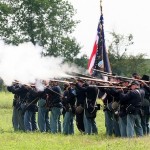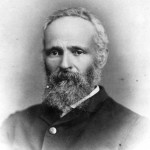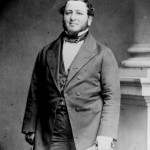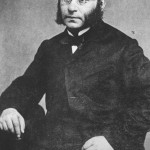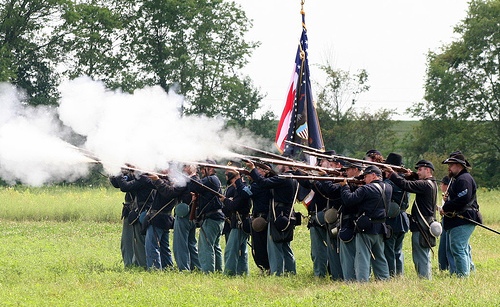
Jews in the American Civil War
Click on a picture to enlarge.
The Civil War divided Jews as it did all Americans. Southern Jews supported the Confederacy; Northern Jews favored the Union. Prior to the war, Jews as a group never took a public stand on slavery. Although many shared antislavery opinions, they viewed the Christian-oriented abolitionist movement with suspicion. A report to the 1853 meeting of a leading antislavery society accurately described Jewish attitudes:
The Jews of the United States have never taken any steps whatever with regard to the Slavery question. As citizens, they deem it their policy “to have everyone choose whichever side he may deem best to promote his own interests and the welfare of his country.”
The objects of so much mean prejudice and unrighteous oppression as the Jews have been for ages, surely they, it would seem, more than any other denomination, ought to be enemies of caste, and friends of universal freedom.
Jewish Views of Slavery
Two vocal Jewish abolitionists were Ernestine Rose and Rabbi David Einhorn. Rose, a Polish immigrant, was a popular speaker and an outspoken advocate of women’s rights. “Emancipation from every kind of bondage is my principle,” she exclaimed. Einhorn, who had brought about American Judaism’s first major reforms at Baltimore’s Congregation Har Sinai, used his pulpit and his journal, Sinai, to preach, “It is the duty of Jews to fight bigotry since, for thousands of years, Jews have consciously or unconsciously fought for freedom of conscience.”
Yet some Jews held other views of the slavery issue. Rabbi Morris Raphall of New York’s Congregation B’nai Jeshurun was a dramatic orator and writer who had the distinction of being the first Jewish clergyman to deliver an opening prayer for a session of the United States Congress (February 1, 1860).
On National Fast Day he delivered a widely reprinted sermon, “A Bible View of Slavery.” In the North, many were disappointed with his words; Southerners viewed it with satisfaction. “Slavery has existed since the earliest time,” the rabbi wrote. “Slave holding is no sin,” he declared, since “slave property is expressly placed under the protection of the Ten Commandments.” Rabbi Einhorn was aghast and forcefully rebutted Raphall’s words in Sinai.
Internal Disagreements
Dismissing Raphall’s literal interpretation of the Bible as representative of all Jewish thought in America, Einhorn insisted that just because a particular practice was condoned in the Bible did not make it right for modern times. The real question, according to Einhorn, was: “Is slavery a moral evil or not?” He argued that the spirit of Judaism, as opposed to its letter, demanded the abolition of slavery. “The Bible” he wrote, “merely tolerates this institution as an evil not to be disregarded and therefore infuses in its legislation a mild spirit gradually to lead to its dissolution.”
Thousands of Jews volunteered and many died on both sides of the conflict. An estimate by Congressman Simon Wolf placed the number in the Union forces at about 8,400 and in the Confederate forces at about 10,000. Other estimates differ, but it is clear that Jews fought on both sides in numbers greater than their percentage in the general population.
There were nine Jewish generals in the North and several in the South. Jews fought not only for their respective causes, but also for equal treatment for themselves. Six .Jewish soldiers in the Union army received the coveted Congressional Medal of Honor for their bravery. When the war ended, Jewish soldiers returned to their homes to rebuild their country and their lives.
In the North, two events galvanized the Jewish community at large during the war: the appointment of a Jewish chaplain to the military and General Grant’s Order No. 11.
August Bondi
The Jew who fought beside John Brown
John Brown (1800-1859), the radical abolitionist, remains one of the most controversial figures in American history. Some see him as a principled freedom fighter, others as an outlaw. Brown led the anti-slavery Free State forces in “Bloody Kansas,” which many historians see as a rehearsal for the Civil War. Brown reached the height of his notoriety in a raid on the Federal arsenal at Harpers Ferry, Virginia, in 1859.
Not well known is that three immigrant Jews were among Brown’s small band of antislavery fighters in Kansas: Theodore Wiener, from Poland; Jacob Benjamin, from Bohemia; and August Bondi (1833-1907), from Vienna. Of the three, August Bondi left the most enduring mark on American Jewish history.
In contrast to Brown, whose ancestors arrived in America on the Mayflower, Bondi’s family immigrated to St. Louis in 1848, in the aftermath of an unsuccessful democratic revolution in Austria. Bondi had been a member of the student revolutionary movement in Vienna and his idealism carried over to his adopted country. In 1855, he moved to Kansas to help establish the Free State movement there.
The Kansas-Nebraska Act of 1854 decreed that, in 1855, the settlers in the Kansas Territory would decide by vote whether Kansas would be a slave or free state. Pro-slavery Border Ruffians and anti-slavery Free States poured into Kansas Territory, hoping to capture the election.
Anti-slavery forces appeared to hold the upper hand, but on election day some 5,000 heavily armed pro-slavery Missourians swarmed into the territory, overwhelmed the polling places, captured the ballot boxes, and elected a pro-slavery legislature. Once in control of state government, the pro-slavery forces launched violent attacks against anti-slavery settlers.
John Brown moved to Kansas in 1855 and his anger rose at the state government’s mistreatment of the anti-slavery majority. In May 1856, Brown led a raid on a company of Border Ruffians at Pottawatomie Creek and massacred more than a dozen of its members. The next day, Brown and his men captured 48 pro-slavery fighters at the Battle of Black Jack, a few miles from Palmyra.
August Bondi, Jacob Benjamin, and Theodore Weiner all fought with Brown at Black Jack. In Bondi’s account of the battle, which can be found in his papers at the American Jewish Historical Society, he recounts marching up a hill beside Brown, ahead of the other men:
We walked with bent backs, nearly crawled, that the tall dead grass of the year before might somewhat hide us from the Border Ruffian marksmen, yet the bullets kept whistling . . . Wiener puffed like a steamboat, hurrying behind me. I called out to him, Nu, was meinen Sie jetzt (Now, what do you think of this). His answer, Sof odom muves (a Hebrew phrase meaning the end of man is death, or in modern phraseology, I guess we’re up against it).
Bondi later wrote of Brown’s leadership:
We were united as a band of brothers by the love and affection toward the man who, with tender words and wise counsel . . . prepared a handful of young men for the work of laying the foundation of a free Commonwealth… He expressed himself to us that we should never allow ourselves to be tempted by any consideration, to acknowledge laws and institutions to exist as of right, if our conscience and reason condemn them.
John Brown left Kansas to make his quixotic attack on Harpers Ferry. Captured, Brown was tried and hanged for treason. Benjamin only lived until 1866, and Weiner died in obscurity in 1906. August Bondi remained true to his convictions, and continued to support the anti-slavery cause in Kansas. When the Civil War broke out, he was among the first to enlist, serving as a first sergeant in the Kansas Cavalry. After the war, Bondi settled in Salina, Kansas, where he served as land clerk, postmaster, member of the school board, director of the state board of charities, a local court judge, and as a trustee of the Kansas Historical Society. He was known for his political integrity and idealism.
Bondi, who died in 1907, described himself as a “consistent Jew” throughout his life, although Salina was too much a frontier community to support a synagogue. When his daughters married, the family traveled to Leavenworth, Kansas, so that a rabbi could officiate. Although his funeral was held at the Salina Masonic Hall, a rabbi from Kansas City conducted the service.
August Bondi’s life traced a remarkable path from guerrilla fighter against slavery to distinguished elected official and pillar of his community. Even in an age and place that could be inhospitable to Jews, Bondi always identified publicly and proudly with his Judaism.
Judah P. Benjamin
The Jewish second-in-command of the Southern Confederacy during the Civil War was once a United States senator.
Judah Philip Benjamin was a politician, a lawyer, a United States Senator, and during the American Civil War, the second-in-command of the Confederacy.
Benjamin was born August 6, 1811 on the island of St. Croix in the Danish West Indies (the present-day Virgin Islands) to Jewish parents. At the time of his birth, Benjamin’s family was in transit from England to America. However, due to the War of 1812, the family was forced to settle in the West Indies until the war ended. They finally arrived in America in 1814, settling in Charleston, South Carolina.
Early Years
Benjamin was an exemplary student. At the age of 14, he entered Yale University. Two years later he was expelled (no record exists as to the reason) and eventually, Benjamin moved to New Orleans.
Benjamin apprenticed at a law firm and began to study for the bar–a complicated course of action because, to become a lawyer in Louisiana, the state’s use of the Napoleonic Code required fluency in both English and French. In order to fulfill this requirement, Benjamin took a job teaching English to the daughter of a prominent Creole family, Natalie St. Martin, so that he could learn French.
The tutoring sessions worked well and provided unintended benefits–on February 12, 1833, the 21-year-old Benjamin and the 16-year-old Natalie were married. As a condition of marriage, Benjamin agreed that the couple’s children would be raised in the Catholic faith. That same year, Benjamin was admitted into the Louisiana bar.
Benjamin’s law practice flourished. He authored a seminal work on legal contracts, Benjamin on Contracts, which examined existing contracts jurisprudence to a depth previously unknown in America. As his wealth and status grew, Benjamin took on the trappings of antebellum Southern aristocracy. He purchased a large sugar plantation on the outskirts of New Orleans and owned 140 slaves. In 1843, Natalie gave birth to the couple’s only child, a daughter named Ninette. Though they never divorced, a few years later his wife moved to Paris and took their daughter with her. The family would never live together again.
Political Career
In 1842 Benjamin was elected, as part of the Whig political party, to the lower house of the Louisiana legislature. Ten years later, he sold his plantation and all of his slaves. That same year, the Louisiana legislature selected him for the United States Senate.
Before he could even be seated as a senator, Benjamin was also offered a seat on the Supreme Court by outgoing President Fillmore. Benjamin declined and was sworn into the Senate on March 4, 1853, becoming the second Jewish senator (after David Levy Yulee of Florida, in 1845).
Benjamin was offered an appointment to the Supreme Court once more, in 1854, by President Tyler. Again, Benjamin declined. In the Senate, Benjamin gained a reputation as a skilled tactician and orator, yet his Jewish background and service for the slave-holding South provided points for attack. An abolitionist senator referred to him as “an Egyptian in Israelite clothing.”
Benjamin served in the body until February 4, 1861 when he resigned from office along with other senators from the seceding Southern states. The Civil War had arrived.
In the Confederate Cabinet during the Civil War
In March of 1861, Benjamin was appointed Attorney General by Confederate President Jefferson Davis, with whom Benjamin had served in the Senate. Davis often referred to Benjamin as “the brains of the Confederacy.” His appointment made Benjamin the first Jew to ever serve in an American cabinet. That same year, Davis requested that he accept the position of Secretary of War.
After public outcry over Confederate failings on the battlefield, in particular when reinforcements never arrived at the battle of Roanoke Island, Benjamin resigned as Secretary of War and was promptly appointed Secretary of State. Benjamin served in that position for the remainder of the war, often working at Davis’ side for up to 12 hours a day.
On February 9, 1865, two months before the Confederate armies surrendered, Benjamin gave the most controversial speech of his political career, an impassioned plea for the Confederacy to arm their slaves and enlist them as Confederate soldiers. In Richmond, before an audience of 10,000, Benjamin asserted: “Let us say to every Negro who wishes to go into the ranks on condition of being made free–‘Go and fight; you are free.’ If we impress them, they will go against us. We know that everyone who could fight for his freedom has had no chance.”
Benjamin argued that Southerners had gotten the opportunity to fight for their independence from the North, but slaves had not. If enlisted, slaves could be fighting for two freedoms, their own from slavery and for Southern independence from the North.
Benjamin’s controversial plan met with disdain among defenders of slavery, but it was eventually passed by the Confederate Congress. Its passage in March 1865 came too late; no slave would ever take up arms for the Confederacy.
Life after the Civil War
Fearing that he would be hung as a traitor, Benjamin fled the United States in the final days of the Civil War. He arrived in England, where, barely a year after the close of the war, he was admitted to the British bar in June of 1866. He would never return to the United States. For the final 18 years of his life, Benjamin practiced as a successful barrister, eventually attaining the highest rank in British legal profession–that of a Queen’s Counsel.
So loathe was Benjamin to have his biography written that he burned all of his personal artifacts and papers before his death. Consequently, historians have had difficulty in reconstructing his life.
Benjamin died in Paris on May 6, 1884 at the age of 72. He was buried in a Paris cemetery with a simple headstone, reading only “Phillipe Benjamin.” In 1936, the United Daughters of the Confederacy erected a monument at his gravesite.
——————————————————————————————————–
Passover After the Civil War
Northern Jews come to the aid of the southern Jewish community.
Since the time of the Israelite Exodus from Egypt, Passover has been a time for families to gather together and celebrate the momentous occasion. Passover is also a time when the Jewish community must make substantial efforts to ensure that no Jew is without the provisions needed to observe the holiday.
As the United States was divided during the Civil War, so too were the Jewish communities of the North and South. Each community felt passionately for its cause and sacrificed on behalf of its side’s war efforts. As the war was nearing its end and the war-torn Confederacy was in ruins, the Jews of the South sought to rebuild their broken lives. When Passover approached, they did not have the means to observe the holiday, and they looked towards their Northern brethren for support. The Northerners immediately put aside their differences and ensured that their Southern co-religionists would have adequate provisions. They did so with compassion and understanding.
In February 1865, two months before Robert E. Lee’s surrender at Appomatox, the Jews of Savannah addressed a request to their Northern brethren for Passover matzot. The requests were sent to Isaac Leeser, spiritual leader of Congregation Mikve Yisrael of Philadelphia and publisher of the Jewish newspaper The Occident, and to Meyer S. Isaacs, a prominent Northern Jewish businessman. Other appeals soon followed.
On March 3, 1865, a Jewish periodical called The Jewish Messenger appealed on behalf of Savannah’s Jews in an editorial [published March 3, 1865]. “An appeal has been made through Mr. N. J. Brady, now at Savannah, on behalf of the Jewish residents of that city. It is desired to procure for them about five thousand pounds of matzot. Many of the inhabitants, formerly wealthy, are in extremely straitened circumstances, and besides, have lost entirely the means of baking for the ensuing Passover.” The editorial urged support, noting the generosity of Savannah Jewry in the past, “The Israelites of Savannah as a community here, in former years, have been prompt and generous in response to calls for aid.”
The first response came from Congregation Shearit Yisrael of New York with a donation of $100, and others followed. Three weeks later, a notice in the Jewish Messenger (March 24, 1865)from the Savannah Relief Fund publicized the responses to their appeal, which contained a list of 35 synagogues, companies, and individuals who contributed a total of $502.90. “We have obtained transportation for and have shipped on steamer Arago three thousand pounds of matzot baked here, together with two thousand pounds sent as a contribution for the Israelites.” Contributions continued to come in from various northern cities.
That Passover, in a nation divided by civil war, the unity of the Jewish community was affirmed. Soon after, appeals would be sent from the beleaguered Southern Jewish communities of Charleston, North Carolina, and Columbia, South Carolina. Those appeals would also be answered. The Jewish periodical The Occident printed in its July 1866 issue an appeal on behalf of Charleston’s Jewish community. “We were pleased to see that the appeals were not looking with mute despair on the past, but working with hope to repair the losses with new success in the future.”
That Passover of 1865, the wounds of the Jewish community caused by the division of the nation began to heal.
Passover Seders During the Civil War
For American Jewry during the Civil War, the Passover story was especially powerful. However, creating a seder in a war zone requires flexibility and creativity.
In 1862, the Jewish Messenger published an account by J. A. Joel of the 23rd Ohio Volunteer Regiment of a seder celebrated by Union soldiers in Fayette, West Virginia. Joel and twenty other Jewish soldiers were granted leave to observe Passover. A soldier home on leave in Cincinnati shipped matzot and hagaddot to his colleagues. Joel wrote:
We . . . sen[t] parties to forage in the country [for Passover food] while a party stayed to build a log hut for the services. . . We obtained two kegs of cider, a lamb, several chickens and some eggs. Horseradish or parsley we could not obtain, but in lieu we found a weed whose bitterness, I apprehend, exceeded anything our forefathers enjoyed.
We had the lamb, but did not know what part was to represent it at the table; but Yankee ingenuity prevailed, and it was decided to cook the whole and put it on the table, then we could dine off it, and be sure we got the right part.
The necessaries for the choroutzes we could not obtain, so we got a brick which, rather hard to digest, reminded us, by looking at it, for what purpose it was intended.
Yankee ingenuity indeed! Historian Bertram Korn observes, “It must have been quite a sight: these twenty men gathered together in a crude and hastily-built log hut, their weapons at their side, prepared as in Egypt-land for all manner of danger, singing the words of praise and faith in the ancient language of Israel.” The seder proceeded smoothly until the eating of the bitter herbs. Joel recounted:
We all had a large portion of the herb ready to eat at the moment I said the blessing; each [ate] his portion, when horrors! What a scene ensued . . . The herb was very bitter and very fiery like Cayenne pepper, and excited our thirst to such a degree that we forgot the law authorizing us to drink only four cups, and . . . we drank up all the cider. Those that drank more freely became excited and one thought he was Moses, another Aaron, and one had the audacity to call himself a Pharaoh. The consequence was a skirmish, with nobody hurt, only Moses, Aaron and Pharaoh had to be carried to the camp, and there left in the arms of Morpheus.
More problematic was the situation of Union soldiers who, unable to form their own seders, were forced to “fraternize” with local Jews. Myer Levy of Philadelphia, for example, was in a Virginia town one Passover late in the war when he saw a young boy sitting on his front steps eating a piece of matzo. According to Korn, when Levy “asked the boy for a piece, the child fled indoors, shouting at the top of his lungs, Mother, there’s a damn Yankee Jew outside!” The boy’s mother invited Levy to seder that night. One wonders how the Virginian family and the Yankee soldier each interpreted the hagadah portions describing the evils of bondage.
On the eve of the fifth day of Passover (April 14), 1865, Abraham Lincoln was shot, and he died of his wounds in the early morning of April 15th, which had already been scheduled as a national day of prayer to mark the end of the Civil War. Jews across the land were gathering in synagogues to give thanks. When news of Lincoln’s death arrived, Korn notes, the synagogue altars were quickly draped in black and, instead of Passover melodies, the congregations chanted Yom Kippur hymns. Rabbis set aside their sermons and wept openly at their pulpits, as did their congregants. Lincoln had been protective of American Jewry, overturning General Grant’s infamous General Order #11 expelling Jews from the Department of Tennessee and supporting legislation allowing Jewish chaplains to serve in the military. The Jewish Record drew the analogy between Lincoln not having lived to see the reconciliation of North and South and Moses dying on Mount Pisgah before he saw the Israelites enter the Promised Land.
It is easy to forget how difficult it can be for Jewish soldiers to serve their country while maintaining the traditions that beautify Judaism. Northern soldiers saw clear parallels between the Union freeing the South’s slaves and Moses leading the ancient Hebrews out of Egypt. Nevertheless, for Jewish Union soldiers fighting between 1861 and 1865 to free others from slavery, the Passover parallels must have made each seder particularly sweet and meaningful.
Jewish Chaplains in the Civil War
Jews enlisted in both the Union and the Confederate armies during the Civil War, but they were not allowed to serve as chaplains to provide religious and emotional support, as well as to preside over Jewish funerals.
For Jews who wish to observe the rituals of their faith, wartime may pose seemingly insurmountable challenges. The exigencies of war can make the observance of the Sabbath, holy days, and kashrut rules very difficult. As the Arab attack on Israel during Yom Kippur of 1973 made clear, Jewish soldiers must, on occasion, subordinate religious observance to combat. Despite the frequent priority of war over religion, there are times, such as the funeral of a fallen Jewish soldier or at the bedside of a wounded Jew, when religion can shape war policy.
At the outbreak of the Civil War, Jews could not serve as chaplains in the U.S. armed forces. When the war commenced in 1861, Jews enlisted in both the Union and Confederate armies. The Northern Congress adopted a bill in July of 1861 that permitted each regiment’s commander, on a vote of his field officers, to appoint a regimental chaplain so long as he was “a regularly ordained minister of some Christian denomination.”
Only Representative Clement L. Vallandigham of Ohio, a non-Jew, protested that this clause discriminated against soldiers of the Jewish faith. Vallandigham argued that the Jewish population of the United States, “whose adherents are . . . good citizens and as true patriots as any in this country,” deserved to have rabbis minister to Jewish soldiers. Vallandigham thought the law, which endorsed Christianity as the official religion of the United States, was blatantly unconstitutional. However, there was no organized national Jewish protest to support Vallandigham and the bill sailed through Congress.
Three months later, a YMCA worker visiting the field camp of a Pennsylvania regiment known as “Cameron’s Dragoons” discovered to his horror that the officers had elected a Jew, Michael Allen, as regimental chaplain. While not an ordained rabbi, Allen was fluent in the Portuguese minhag (ritual) and taught at the Philadelphia Hebrew Education Society. As Allen was neither a Christian nor an ordained minister, the YMCA representative filed a formal complaint with the Army. Obeying the recently enacted law, the Army forced Allen to resign his post.
Hoping to create a test case based strictly on a chaplain’s religion and not his lack of ordination, Colonel Max Friedman and the officers of the Cameron’s Dragoons then elected an ordained rabbi, the Reverend Arnold Fischel of New York’s Congregation Shearith Israel, to serve as regimental chaplain-designate. When Fischel, a Dutch immigrant, applied for certification as chaplain, the Secretary of War, none other than Simon Cameron, for whom the Dragoons were named, complied with the law and rejected Fischel’s application.
Fischel’s rejection stimulated American Jewry to action. The American Jewish press let its readership know that Congress had limited the chaplaincy to those who were Christians and argued for equal treatment for Judaism before the law. This initiative by the Jewish press irritated a handful of Christian organizations, including the YMCA, which resolved to lobby Congress against the appointment of Jewish chaplains. To counter their efforts, the Board of Delegates of American Israelites, one of the earliest Jewish communal defense agencies, recruited Reverend Fischel to live in Washington, minister to wounded Jewish soldiers in that city’s military hospitals, and lobby President Abraham Lincoln to reverse the chaplaincy law. Although today several national Jewish organizations employ representatives to make their voices heard in Washington, Fischel’s mission was the first such undertaking of this type.
Armed with letters of introduction from Jewish and non-Jewish political leaders, Fischel met on December 11, 1861, with President Lincoln to press the case for Jewish chaplains. Fischel explained to Lincoln that, unlike many others who were waiting to see the president that day, he came not to seek political office, but to “contend for the principle of religious liberty, for the constitutional rights of the Jewish community, and for the welfare of the Jewish volunteers.” According to Fischel, Lincoln asked questions about the chaplaincy issues, “fully admitted the justice of my remarks . . . and agreed that something ought to be done to meet this case.” Lincoln promised Fischel that he would submit a new law to Congress “broad enough to cover what is desired by you in behalf of the Israelites.”
Lincoln kept his word, and seven months later, on July 17, 1862, Congress finally adopted Lincoln’s proposed amendments to the chaplaincy law to allow “the appointment of brigade chaplains of the Catholic, Protestant and Jewish religions.” In historian Bertram Korn’s opinion, Fischel’s “patience and persistence, his unselfishness and consecration … won for American Jewry the first major victory of a specifically Jewish nature . . . on a matter touching the Federal government.” Korn concluded, “Because there were Jews in the land who cherished the equality granted them in the Constitution, the practice of that equality was assured, not only for Jews, but for all minority religious groups.”
http://www.myjewishlearning.com/history/Modern_History/1700-1914/America_at_the_Turn_of_the_Century/Acceptance_in_the_US/Civil_War.shtml


